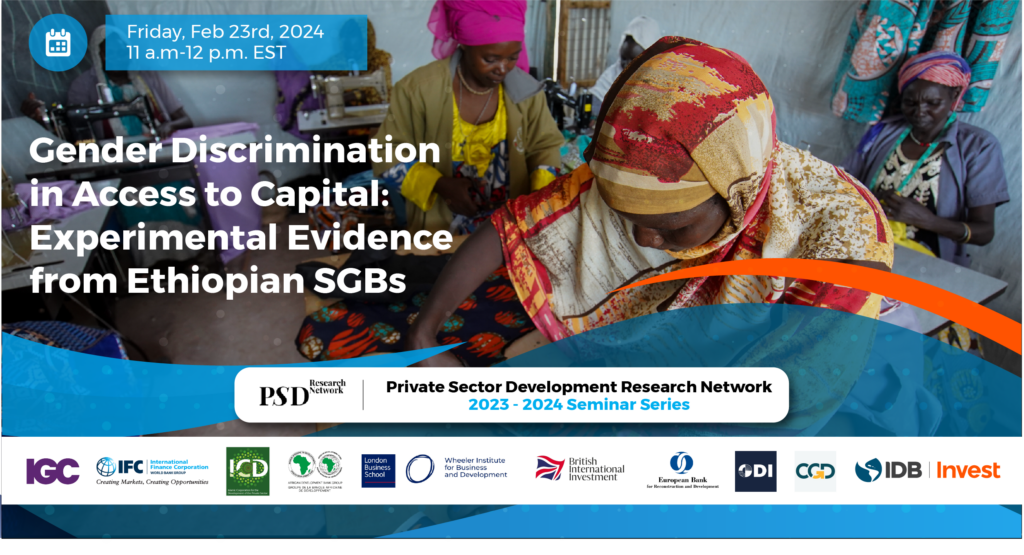Last week, Private Sector Development Research Network (PSDRN) hosted a seminar on results gathered from an experiment ran in Ethiopia covering evidence of gender discrimination. Dr Shanthi Manian, Assistant Professor at Washington State University led the presentation based on the findings of her research paper ‘Discrimination and Access to Capital: Experimental Evidence from Ethiopia’, co-written with Dr Shibiru Ayalew (Adama University) and Dr Ketki Sherhi (University of Tennessee).

The overall approach of the paper was to investigate the role of gender discrimination in the allocation of capital by financial providers within the Ethiopian business ecosystem. Contrary to popular opinion, the study found no evidence of discrimination against female-led / female-owned businesses in the allocation of capital.
The paper comes to this conclusion through the results of a large-scale experiment run in Ethiopia by randomly assigning gender to business-owners. Financial providers evaluated 916 businesses. This method allowed for a strong investigation into possible gender biases in capital allocation decisions. The results showed that there was little gender bias in the evaluation scores and loan-forwarding decisions. Financial institutions projected similar business outcomes regardless of gender, aligning with a model of discrimination based on accurate beliefs rather than gender bias.
The paper therefore challenges the premise that increasing capital access for women leads to a trade-off with allocating capital to high performing businesses. The results suggest that gender does not serve as a meaningful predictor of business performance, and that financial providers prioritise other information over gender when targeting high-performing businesses. Therefore, there is no substantial trade-off between promoting gender equity and optimising capital allocation to the most promising enterprises.
The Experiment
The experiment utilised a business plan competition called EthioSpur, which was launched by the Entrepreneurship Development Institute (EDI) in 2019. The competition’s primary goal is to provide capital and awards to promising businesses, following a common method to stimulate entrepreneurial growth in developing countries. The experiment’s design is aimed at determining if financial providers, recruited to judge the competition, displayed discrimination against female-owned businesses. To identify gender discrimination, the experiment adopted an audit study approach in which financial providers received packets of applications with randomly assigned genders of the applicants.
The competition targeted existing entrepreneurs who met eligibility criteria focused on majority ownership, operational status for at least four months before the competition, and an idea for expansion to support business growth. The application form was meticulously designed to reflect criteria used by financial providers in real-world capital lending decisions, thus enhancing the external validity of the findings. This form collected comprehensive information on current business characteristics, expansion plans, and additional information on the business owner (e.g., marital status, age, gender). To ensure wide accessibility, the competition was promoted nationally, and applications were made available in multiple languages, submitted via various means (online, hard copy, or email), with assistance provided by EDI for completing applications.
Experienced financial providers from lending institutions across Addis Ababa, including banks and microfinance institutions, were recruited as judges based on specific criteria to evaluate loan applications. The judges reviewed the applications remotely and completed an evaluation form for each business, maintaining the anonymity of their assessments to avoid social desirability bias. The evaluation form was divided into sections designed to ensure the clarity of the randomly assigned gender without revealing the research question, ask judges to provide predictions of business performance under different scenarios, and collect judges’ beliefs about the business owner. The judges’ overall score for the business determined the competition’s prizes, with a question included to gauge if the judge would recommend the business for a loan at their institution, serving as a proxy for real-world capital allocation decisions. This experimental design, along with the random assignment of business owner gender and the thorough evaluation process by experienced financial providers, aimed to provide a robust analysis of gender discrimination in capital allocation decisions within the context of Ethiopia’s financial sector.
Conclusion
Despite no evidence of gender discrimination in financial decisions from the experiment, female-owned businesses still underperform, indicating a level of systemic issues. This disparity could be linked to other factors such as: limited access to collateral for women, stemming from historical wealth inequalities, and industry segregation that places women in lower-growth sectors. Furthermore, childcare responsibilities could restrict women’s full engagement in their business activities. Addressing these challenges requires further policy changes that go beyond just financial access, and provide a more equitable environment for female entrepreneurs to succeed along.
About the author

Donald Innocent-Ike, MBA2025 is an Outreach and Communications Intern at the Wheeler Institute for Business and Development. After graduating from Georgia Institute of Technology with a Bachelor’s degree in Electrical Engineering & Economics and a Master’s in Computer Science & Quantitative Finance, Donald worked as a Graduate Research Assistant, before becoming an Associate at Truist Securities in Atlanta. He has a keen interest in finance, development, and business as a force for good, particularly in emerging markets.
Discover our research portal and subscribe to our mailing list now
